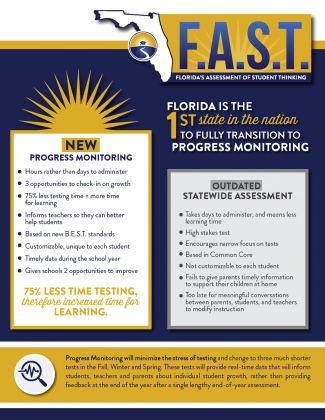The new plan is F.A.S.T.
Gov. Ron DeSantis signed a Florida Senate bill last week that eliminates the Florida Standards Assessment (FSA) and replaces it with computer-based progress monitoring, especially in English language arts and mathematics.
Where Tallahassee leaders touted it as a groundbreaking end to high-stakes, end-of-year testing, the change won’t cause a big shake-up in Osceola County’s schools.
The new plan is F.A.S.T. (Florida Statewide Assessment of Student Thinking) — assessments spaced out three times during the year for grades kindergarten through 10th grade. But, in the wake of the COVID-19 pandemic, which caused the closure of schools for in-person learning for the last three months of the 2019-20 school year, the School District of Osceola County already implemented some progress monitoring, Superintendent Dr. Debra Pace said.
“When we reopened schools in August 2020, we found some of those learning losses we expected,” Pace said. “We knew we’d have to address those gaps in learning.”
According to Senate Bill 1048 language, the first two tests would provide teachers, students and parents a clear picture of a student potential learning losses, and the last test would provide end-of-year results in order to arrange for summer school enrichment.
“We’ve already been progress monitoring. Our team has been looking at everything carefully to eliminate any redundancies,” Pace said. “We have concerns about over-testing. We’re not testing just to test. We want to intervene early so we can stimulate the most learning possible, and ensure teachers and parents have the information they need to support individual students’ learning.”
According to a release from the Governor’s office, “Progress monitoring will benefit students, teachers and parents by allowing for informed instruction in a timely manner, helping instruction to be tailored to each student’s individual needs.”
Per the bill, class time dedicated to state testing would be capped at 5 percent. That’s a concern of classroom teachers said April Isaacs, a St. Cloud High reading teacher and the vice president of the Osceola County Educators Association.
“We know this won’t solve everything,” she said. “When the Governor says this ‘removes highstakes testing,’ that’s not necessarily the case.”
She said teachers simply want to make sure their students are tested on what they’re educated on, and have the time to do that.
“The FSA didn’t always accomplish what we wanted. Then again, the FCAT (FSA predecessor) didn’t either,” Isaacs said. “There isn’t a perfect testing system. No one ever says, ‘We should never assess,’ but when we keep filling time with testing, we don’t always get the intended result; parents want students to be ready to be successful.”
Orlando Rep. Rene Plasencia, a former classroom teacher, was one of the bill’s co-sponsors of its companion House of Representatives bill.
“This bill is the first step in streamlining and reducing test time in the classroom. Being able to work on this bill is the reason why I ran for office,” he said.
BUDGET EARMARKS: A day after signing the bill, DeSantis announced $289 million in items in the upcoming fiscal year budget for educational programs, including:
$105 million for afterschool and summer learning camps;
$47 million for primary materials aligned to Florida’s new standards for English Language Arts (ELA), math, civics and Holocaust education;
$50 million to support reading intervention and professional development for reading coaches;
$44 million to support STEM and hands-on learning programs;
$22.5 million for resources to help parents be more involved in their children’s education; and
$5 million to establish Regional Mental Health Resiliency Teams.



